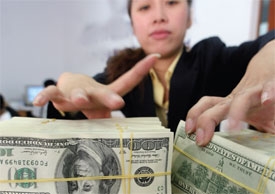Calm heads prevail as the forex market to remain cool
 Last week, the central bank decided to increase the reserve requirement ratio by 1 per cent to 8 per cent for foreign currency deposits less than 12 months and to 6 per cent for foreign currency deposits over 12 months.
Last week, the central bank decided to increase the reserve requirement ratio by 1 per cent to 8 per cent for foreign currency deposits less than 12 months and to 6 per cent for foreign currency deposits over 12 months.
That means for each $100 mobilised in less than a 12-month term, a bank must give $8 to the State Bank instead of $7 as reserves.
Nguyen Thanh Toai, deputy general director of ACB, said this would force local lenders to lift dollar lending interest rates.
The State Bank also requested local lenders apply strict foreign currency lending to limit clients who do not have enough dollar denominated revenues from business operations.
“The State Bank will inspect banks with high dollar denominated credit growth,” the authority noted.
Nguyen Thi Kim Thanh, head of the central bank’s Banking Strategy Institute, said this was the right move to address high dollar credit growth.
“With dollar lending rates less than half of Vietnam dong lending rates, the gap is too large. Now with this reserve ratio hike and efforts to pull down Vietnam dong lending rate, the gap is narrowed,” said Thanh.
For a few months, local financial experts expressed concerns over possible surges in dollar demands by the end of 2011 as dollar borrowers have to source greenbacks to return due loans.
In March, the State Bank already increased the foreign currency reserve requirement ratio by 2 per cent to 4-6 per cent to limit the foreign currency lending. However, by end of August, while Vietnam dong credit growth was less than 3 per cent year-to-date, the figure for dollar credit was almost 25 per cent.
Marc Djandji, director of research at Viet Capital Securities Company, was concerned about foreign exchange stability following a dong interest rate decline. “The decision to raise the reserve requirement ratio of foreign currencies suggests that the central bank is also targeting a stable exchange rate as it signals that it wants to control dollar speculation. However, from now until the year’s end, the central bank might have a tough time keeping the Vietnam dong stable especially if it goes through with reducing Vietnam dong interest rates and considering the demand for dollars once the loans that have been taken out since early this year need to be repaid,” said Djandji.
What the stars mean:
★ Poor ★ ★ Promising ★★★ Good ★★★★ Very good ★★★★★ Exceptional
Related Contents
Latest News
More News
- Human-centred governance seen as key to AI development (December 19, 2025 | 18:19)
- TECHFEST Vietnam 2025 links startups with policy and capital (December 15, 2025 | 18:21)
- Long Thanh International Airport welcomes first Vietnam Airlines test flight (December 15, 2025 | 18:01)
- Foreign fruits flood Vietnamese market (December 09, 2025 | 13:22)
- Vietnam’s fruit and vegetable exports reach $7.8 billion in first 11 months (December 05, 2025 | 13:50)
- Vietnam shapes next-generation carbon market (November 26, 2025 | 15:33)
- PM urges Ho Chi Minh City to innovate and remain Vietnam’s economic locomotive (November 26, 2025 | 15:29)
- Experts chart Vietnam's digital finance path: high hopes, high stakes (November 14, 2025 | 10:56)
- Vietnam’s seafood imports surge 30 per cent in first 10 months (November 10, 2025 | 19:35)
- Vietnam’s durian exports hit $1 billion milestone (October 30, 2025 | 17:41)

 Tag:
Tag:




















 Mobile Version
Mobile Version